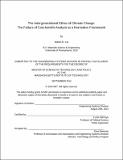The intergenerational ethics of climate change : the failure of cost-benefit analysis as a normative framework
Author(s)
Lee, Nathan R. (Nathan Ross)
DownloadFull printable version (654.6Kb)
Other Contributors
Massachusetts Institute of Technology. Technology and Policy Program.
Advisor
Lucas Stanczyk.
Terms of use
Metadata
Show full item recordAbstract
Climate change generates a conflict between generations: while it is in the interest of the current generation to continue to exploit inexpensive carbon-based fuel to drive economic growth, it is in the interest of future generations that we reduce our carbon emissions by making these fuels more expensive. This raises the following question: what moral framework should we use to adjudicate between the interests of different generations? In this work, I argue that the commonly used framework of "cost-benefit analysis"-the analytic framework for public policy that developed out of the field of welfare economics-fails as a normative framework for intergenerational policy. For one, by aggregating costs and benefits across all generations, it ignores that what matters is each generation. For another, by reducing all value into a unitary objective function, it ignores important distinctions between different categories of moral claims. Third, by attempting to optimize a function across all time, it reflects a false sense of knowledge about the distant future. For all these reasons-and more-I conclude that this approach cannot offer a reasonable normative framework for intergenerational public policy. In its stead, I propose an "intergenerational threshold" principle which avoids aggregating generations together, gives space for different categories of value, and, I will argue, is more robust to the epistemic limitations of intergenerational policy analysis.
Description
Thesis: S.M. in Technology and Policy, Massachusetts Institute of Technology, Engineering Systems Division, 2014. This electronic version was submitted by the student author. The certified thesis is available in the Institute Archives and Special Collections. Cataloged from student-submitted PDF version of thesis. Includes bibliographical references (pages 50-52).
Date issued
2014Department
Massachusetts Institute of Technology. Engineering Systems DivisionPublisher
Massachusetts Institute of Technology
Keywords
Engineering Systems Division., Technology and Policy Program.